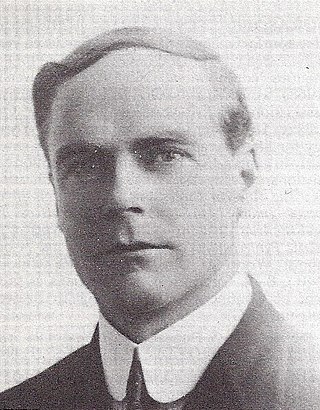Pentecostalism or classical Pentecostalism is a Protestant Charismatic Christian movement that emphasizes direct personal experience of God through baptism with the Holy Spirit. The term Pentecostal is derived from Pentecost, an event that commemorates the descent of the Holy Spirit upon the Apostles and other followers of Jesus Christ while they were in Jerusalem celebrating the Feast of Weeks, as described in the Acts of the Apostles.

The Elim Pentecostal Church is a UK-based Pentecostal Christian denomination. It was founded in Ireland in 1915 by George Jeffreys and is the second largest pentecostal denomination in the UK.
The Latter Rain, also known as the New Order or the New Order of the Latter Rain, was a post-World War II movement within Pentecostal Christianity which remains controversial. The movement saw itself as a continuation of the restorationism of early Pentecostalism. The movement began with major revivals between 1948 and 1952 and became established as a large semi-organized movement by 1952. It continued into the 1960s. The movement had a profound impact on subsequent movements as its participants dispersed throughout the broader charismatic and Pentecostal movements beginning in the 1960s.
Barry Mostyn Chant is an Australian academic, pentecostal pastor and author. His most significant contribution to the Pentecostal movement in Australia was as its primary historian. Heart of Fire: The story of Australian Pentecostalism was published by the House of Tabor in 1973, a publishing company attached to Tabor College Australia, in Adelaide, which Chant founded and led as principal.

The Apostolic Church is an international Christian denomination and Pentecostal movement that emerged from the Welsh Revival of 1904–1905. Although the movement began in the United Kingdom, the largest national Apostolic Church became the Apostolic Church Nigeria. The term "Apostolic" refers to the role of apostles in the denomination's church government, as well as a desire to emulate 1st century Christianity in its faith, practices, and government.

James Gordon Lindsay was a revivalist preacher, author, and founder of Christ for the Nations Institute.
Donald Henry Frere Gee was an English Pentecostal Bible Teacher. He wrote the book Wind and Flame, which is the story of Pentecostalism in Europe in the 20th century. He was called "The Apostle of Balance."

The Apostolic Faith Mission of South Africa (AFM) is a classical Pentecostal Christian denomination in South Africa. With 1.2 million adherents, it is South Africa's largest Pentecostal church and the fifth largest religious grouping in South Africa representing 7.6 percent of the population. Dr. Isak Burger has led the AFM as president since 1996 when the white and black branches of the church were united. It is a member of the Apostolic Faith Mission International, a fellowship of 23 AFM national churches. It is also a member of the South African Council of Churches. The AFM is one of the oldest Pentecostal movement is South Africa with roots in the Azusa Street Revival, the Holiness Movement teachings of Andrew Murray and the teachings of John Alexander Dowie. The AFM had an interracial character when it started, but, as in American Pentecostalism, this interracial cooperation was short-lived. The decades from the 1950s to the 1980s were marked by the implementation of apartheid. After 1994, the white AFM moved rapidly towards unification with the black churches. By 1996, all the AFM churches were united in a single multi-racial church. The constitution of the AFM blends at the national level the elements of a presbyterian polity with an episcopal polity. Decentralization is a major feature of its constitution, which allows local churches to develop their own policies. The Apostolic Faith Mission displays a variety of identities and ministry philosophies, including seeker-sensitive, Word of Faith, Presbyterian, and classical Pentecostal.
The Australian Christian Churches (ACC), formerly Assemblies of God in Australia, is a network of Finished Work Pentecostal churches in Australia affiliated with the World Assemblies of God Fellowship, which is the largest Pentecostal denomination in the world.

The Assemblies of God USA (AG), officially The General Council of the Assemblies of God, is a Pentecostal Christian denomination in the United States and the U.S. branch of the World Assemblies of God Fellowship, the world's largest Pentecostal body. The AG reported 2.9 million adherents in 2022. In 2011, it was the ninth largest Christian denomination and the second largest Pentecostal denomination in the United States. The Assemblies of God is a Finished Work denomination, and it holds to a conservative, evangelical and classical Arminian theology as expressed in the Statement of Fundamental Truths and position papers, which emphasize such core Pentecostal doctrines as the baptism in the Holy Spirit, speaking in tongues, divine healing and the Second Coming of Jesus Christ.
The Pentecostal Church of New Zealand (PCNZ) was a Finished Work Pentecostal denomination established in 1924 that was the first attempt at organizing the Pentecostal movement in New Zealand. After a series of splits, the church disbanded in 1952.

The Healing Revival is a term used by many American Charismatics in reference to a Christian revival movement that began in June 1946 and continued through the 1950s. The Healing Revival sparked the Latter Rain movement in 1948 and the two movements were interrelated. The period of revival was a significant influence on the modern charismatic movement.
The New Zealand Samoan Assemblies of God (SA/G) or (SAOG), officially The General Council of the Samoan Assemblies of God in New Zealand Inc. are a group of Pentecostal congregations predominantly made up of Samoan people. They are affiliated with the Samoan Assemblies of God church.

William Howard Durham was an early Pentecostal preacher and theologian, best known for advocating the Finished Work doctrine.
New Life Fellowship Association, commonly known as New Life Fellowship (NLF), is a group of megachurches primarily located in India, that is characterised by adherence to the Holiness movement, Evangelicalism, and Biblical fundamentalism. New Life Fellowship Association Mumbai (Bombay) is a megachurch with 70,000 members.

The Church of Pentecost is a Pentecostal denomination that originates from Ghana. The Church currently has a presence in more than 151 countries globally. Its current Chairman, who happens to be its highest officer worldwide, is Apostle Eric Nyamekye.
Pentecostalism is a renewal movement within Protestant Christianity that places special emphasis on a direct personal relationship with God and experience of God through the baptism with the Holy Spirit. For Christians, this event commemorates the descent of the Holy Spirit upon the followers of Jesus Christ, as described in the second chapter of the Book of Acts. Pentecostalism was established in Kerala, India at the start of the 20th century.

The Apostolic Church - Ghana is a denomination emanating from the Pentecostal movement which started from the 1904–1905 Welsh revival. It practices self-governing and claims to own local churches in every district in Ghana and foreign mission fields with its headquarters in Accra, Ghana. The church is firmly identified as a Pentecostal, Trinitarian, Evangelical and Bible-believing church.
Charismatic Christianity is a form of Christianity that emphasizes the work of the Holy Spirit and spiritual gifts as an everyday part of a believer's life. It has a global presence in the Christian community. Practitioners are often called charismatic Christians or renewalists. Although there is considerable overlap, charismatic Christianity is often categorized into three separate groups: Pentecostalism, the Charismatic movement, and the neo-charismatic movement.







